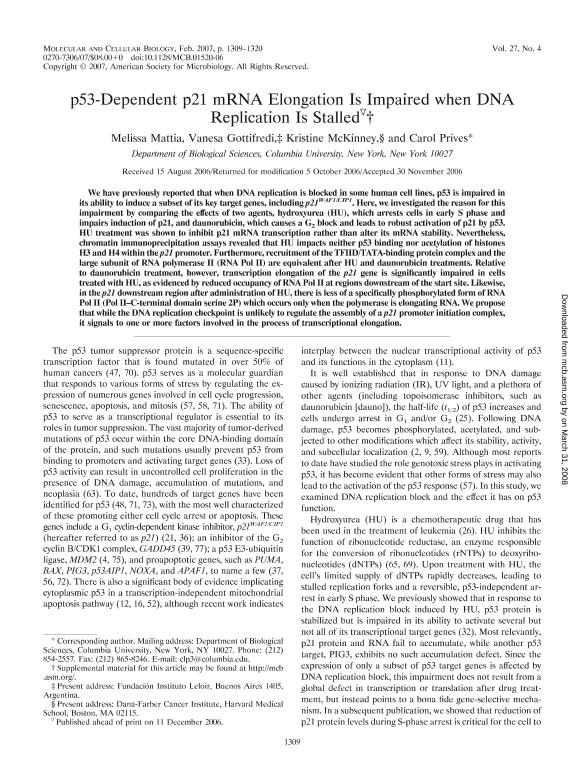Mostrar el registro sencillo del ítem
dc.contributor.author
Mattia, Melissa

dc.contributor.author
Gottifredi, Vanesa

dc.contributor.author
McKinney, Kristine
dc.contributor.author
Prives, Carol
dc.date.available
2017-11-21T18:44:47Z
dc.date.issued
2006-12
dc.identifier.citation
Mattia, Melissa; Gottifredi, Vanesa; McKinney, Kristine; Prives, Carol; p53-Dependent p21 mRNA elongation is impaired when DNA replication is stalled; American Society for Microbiology; Molecular and Cellular Biology; 27; 4; 12-2006; 1309-1320
dc.identifier.issn
0270-7306
dc.identifier.uri
http://hdl.handle.net/11336/28657
dc.description.abstract
We have previously reported that when DNA replication is blocked in some human cell lines, p53 is impaired in its ability to induce a subset of its key target genes, including p21(WAF1/CIP1). Here, we investigated the reason for this impairment by comparing the effects of two agents, hydroxyurea (HU), which arrests cells in early S phase and impairs induction of p21, and daunorubicin, which causes a G(2) block and leads to robust activation of p21 by p53. HU treatment was shown to inhibit p21 mRNA transcription rather than alter its mRNA stability. Nevertheless, chromatin immunoprecipitation assays revealed that HU impacts neither p53 binding nor acetylation of histones H3 and H4 within the p21 promoter. Furthermore, recruitment of the TFIID/TATA-binding protein complex and the large subunit of RNA polymerase II (RNA Pol II) are equivalent after HU and daunorubicin treatments. Relative to daunorubicin treatment, however, transcription elongation of the p21 gene is significantly impaired in cells treated with HU, as evidenced by reduced occupancy of RNA Pol II at regions downstream of the start site. Likewise, in the p21 downstream region after administration of HU, there is less of a specifically phosphorylated form of RNA Pol II (Pol II-C-terminal domain serine 2P) which occurs only when the polymerase is elongating RNA. We propose that while the DNA replication checkpoint is unlikely to regulate the assembly of a p21 promoter initiation complex, it signals to one or more factors involved in the process of transcriptional elongation
dc.format
application/pdf
dc.language.iso
eng
dc.publisher
American Society for Microbiology

dc.rights
info:eu-repo/semantics/openAccess
dc.rights.uri
https://creativecommons.org/licenses/by-nc-sa/2.5/ar/
dc.subject.classification
Otras Ciencias Biológicas

dc.subject.classification
Ciencias Biológicas

dc.subject.classification
CIENCIAS NATURALES Y EXACTAS

dc.title
p53-Dependent p21 mRNA elongation is impaired when DNA replication is stalled
dc.type
info:eu-repo/semantics/article
dc.type
info:ar-repo/semantics/artículo
dc.type
info:eu-repo/semantics/publishedVersion
dc.date.updated
2017-11-03T20:21:21Z
dc.identifier.eissn
1098-5549
dc.journal.volume
27
dc.journal.number
4
dc.journal.pagination
1309-1320
dc.journal.pais
Estados Unidos

dc.journal.ciudad
Washington
dc.description.fil
Fil: Mattia, Melissa. Columbia University; Estados Unidos
dc.description.fil
Fil: Gottifredi, Vanesa. Consejo Nacional de Investigaciones Científicas y Técnicas. Oficina de Coordinación Administrativa Parque Centenario. Instituto de Investigaciones Bioquímicas de Buenos Aires. Fundación Instituto Leloir. Instituto de Investigaciones Bioquímicas de Buenos Aires; Argentina. Columbia University; Estados Unidos
dc.description.fil
Fil: McKinney, Kristine. Columbia University; Estados Unidos
dc.description.fil
Fil: Prives, Carol. Columbia University; Estados Unidos
dc.journal.title
Molecular and Cellular Biology

dc.relation.alternativeid
info:eu-repo/semantics/altIdentifier/url/http://mcb.asm.org/content/27/4/1309
dc.relation.alternativeid
info:eu-repo/semantics/altIdentifier/doi/https://doi.org/10.1128/MCB.01520-06
Archivos asociados
